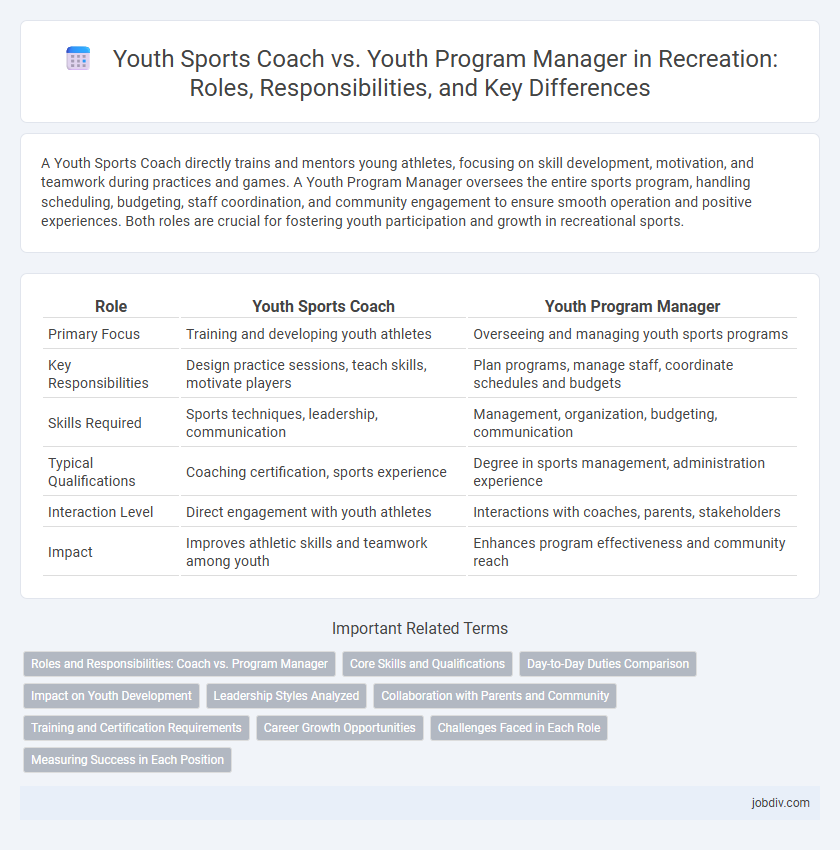A Youth Sports Coach directly trains and mentors young athletes, focusing on skill development, motivation, and teamwork during practices and games. A Youth Program Manager oversees the entire sports program, handling scheduling, budgeting, staff coordination, and community engagement to ensure smooth operation and positive experiences. Both roles are crucial for fostering youth participation and growth in recreational sports.
Table of Comparison
| Role | Youth Sports Coach | Youth Program Manager |
|---|---|---|
| Primary Focus | Training and developing youth athletes | Overseeing and managing youth sports programs |
| Key Responsibilities | Design practice sessions, teach skills, motivate players | Plan programs, manage staff, coordinate schedules and budgets |
| Skills Required | Sports techniques, leadership, communication | Management, organization, budgeting, communication |
| Typical Qualifications | Coaching certification, sports experience | Degree in sports management, administration experience |
| Interaction Level | Direct engagement with youth athletes | Interactions with coaches, parents, stakeholders |
| Impact | Improves athletic skills and teamwork among youth | Enhances program effectiveness and community reach |
Roles and Responsibilities: Coach vs. Program Manager
A youth sports coach primarily focuses on developing athletes' skills, providing game strategies, and fostering teamwork through direct training and mentorship. In contrast, a youth program manager oversees the overall organization of sports programs, including scheduling, budgeting, staff coordination, and ensuring compliance with safety regulations. Both roles are essential, with coaches emphasizing hands-on athletic development while program managers handle administrative and operational responsibilities.
Core Skills and Qualifications
Youth sports coaches excel in leadership, communication, and sport-specific expertise, requiring certifications such as CPR and first aid alongside coaching licenses to effectively train and mentor athletes. Youth program managers prioritize organizational, budgeting, and strategic planning skills, often holding degrees in sports management or recreation administration to oversee program development and staff coordination. Both roles demand strong interpersonal abilities, but coaches focus on athlete development while managers emphasize program growth and community engagement.
Day-to-Day Duties Comparison
Youth sports coaches focus on developing athletes' skills, conducting training sessions, and creating game strategies to enhance performance. Youth program managers oversee scheduling, budgeting, staff coordination, and compliance with organizational policies to ensure program success. Both roles require communication and leadership, but coaches engage directly with athletes while managers handle administrative responsibilities.
Impact on Youth Development
Youth sports coaches directly influence skill-building, teamwork, and confidence by providing hands-on training and mentorship during practices and games. Youth program managers create structured opportunities and environments that support long-term development, ensuring access to resources and well-rounded programming. Together, these roles foster physical, social, and emotional growth, significantly shaping youth development outcomes.
Leadership Styles Analyzed
Youth sports coaches typically adopt a hands-on leadership style, emphasizing direct skill development, motivation, and team cohesion through on-field interaction and personalized feedback. Youth program managers employ a strategic leadership approach, focusing on organizational planning, resource allocation, and policy implementation to ensure the smooth operation of multiple teams and programs. Analyzing these distinct leadership styles highlights how coaches drive performance on the ground while program managers foster sustainable growth and community engagement.
Collaboration with Parents and Community
Youth sports coaches foster collaboration with parents by maintaining open communication, providing regular updates on athlete progress, and encouraging parental involvement during practices and games. Youth program managers coordinate community partnerships, secure funding, and organize events that engage local stakeholders, enhancing program visibility and support. Both roles prioritize building strong relationships with families and community members to create a positive, inclusive environment for youth development.
Training and Certification Requirements
Youth sports coaches typically require certifications in CPR, first aid, and sport-specific coaching credentials such as those offered by the National Alliance for Youth Sports (NAYS). Youth program managers often need advanced certifications in program administration, risk management, and leadership, frequently supported by degrees or professional development courses in recreation or sports management. Both roles emphasize continuous education, but program managers have a broader focus on organizational skills and compliance with local and national regulations.
Career Growth Opportunities
Youth sports coaches primarily focus on developing athletes' skills and team dynamics, with career growth often advancing through gaining certifications and moving into higher-level coaching roles. Youth program managers oversee multiple sports activities, budgets, and staff, providing broader leadership experience that can lead to roles in sports administration or nonprofit management. Both paths offer unique opportunities, but program managers typically experience more diverse career advancement options due to their strategic and organizational responsibilities.
Challenges Faced in Each Role
Youth sports coaches encounter challenges such as maintaining player motivation, managing diverse skill levels, and ensuring safety during practices and games. Youth program managers face difficulties in securing funding, coordinating multiple teams or activities, and addressing policy compliance while fostering community engagement. Both roles require adaptability, strong communication skills, and a commitment to youth development within recreational sports.
Measuring Success in Each Position
Youth sports coaches measure success primarily through individual player skill development, team cohesion, and game performance improvements. Youth program managers evaluate success by tracking program enrollment numbers, retention rates, community engagement levels, and overall program growth. Both roles rely on qualitative feedback from participants and parents to assess the effectiveness of their strategies and initiatives.
Youth Sports Coach vs Youth Program Manager Infographic

 jobdiv.com
jobdiv.com